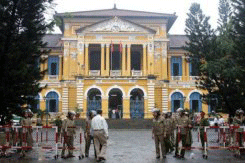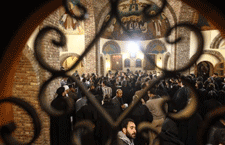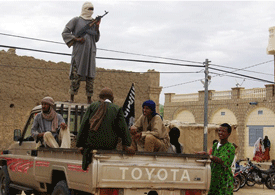News from Vietnam, Egypt and Mali
Tuesday's World Events — Posted on October 2, 2012
VIETNAM – Communist Government Convicts 3 Bloggers Over Posts

File photo shows the Ho Chi Minh City People’s Court House. A Vietnam court jailed three bloggers for “anti-state propaganda.”
A Vietnamese court convicted three prominent bloggers and sentenced them to between four and 12 years in prison, the latest step in a crackdown against online dissent in the tightly policed communist state.
One of the defendants’ lawyers, Ha Huy Son, said the three bloggers were found guilty of writing articles that opposed the government, diplomats said. Monday’s verdict came after a one-day trial in Ho Chi Minh City.
Vietnam’s government has stepped up its campaign against cyber-dissidents recently, ordering police to take action against three websites this month in what analysts and diplomats say is a bid to inculcate a sense of fear among the growing numbers of Vietnamese who are going online to obtain news and exchange opinions on events in the country. …
Internet [usage] rates are growing faster in Vietnam than in many other emerging nations. Around 34% of the country’s 90 million people are online, a larger proportion than in neighbors such as Thailand and Indonesia. …
Mr. Nguyen Van Hai, alias Dieu Cay, was sentenced to 12 years in prison, while Ms. Ta Phong Tan was handed a 10-year sentence. Mr. Phan Thanh Hai, the only one of the trio who pleaded guilty, was given a four-year sentence. The heavy sentences could herald more arrests and convictions.
All three bloggers, including Phan Thanh Hai, belonged to the “Free Journalists Club,” which writes prolifically about political, economic and social issues in Vietnam. …
Human-rights groups sharply criticized the lengthy prison sentences. Phil Robertson, deputy director of the Asian division at New York-based Human Rights Watch, said “these harsh sentences against bloggers are absolutely outrageous, and show the depth of the Vietnam government’s intolerance of views that oppose its own.”
EGYPT – Christians flee Egypt town after death threats

Egyptian Christian Copts gather at the Bishoy Monastery in March 2012. Several Christian families have fled their homes in Egypt’s Sinai peninsula after receiving death threats from suspected Islamist militants, officials and residents told AFP.
Several Christian families have fled their homes in Egypt’s Sinai peninsula after receiving death threats from suspected Islamist militants, officials and residents told AFP on Friday.
Last week, flyers began circulating in the town of Rafah on the Gaza Strip border demanding that its tiny Coptic [Christian] population move out, residents said.
Officials at the local church informed the authorities of the threats, but no actin was taken, they added.
Days later, a shop belonging to one of the families was fired on with automatic rifles, witnesses said.
The events prompted the families to leave Rafah but there were conflicting accounts over whether they had done so voluntarily or been evicted.
“The families have left Rafah and gone to El-Arish,” one official said on condition of anonymity.
Another official denied that any Coptic families had left at all.
Representatives of the families, many of whom hold government jobs as well private businesses, sat down with the governor of North Sinai earlier this week and asked to be transfered to the nearby town of Al-Arish, the official said. …
MALI – Islamists ‘increasingly repressive’
 Radical Islamists in control of northern Mali are becoming “increasingly repressive,” amputating limbs, whipping people in the streets and stoning to death a couple accused of adultery, a human rights group has said.
Radical Islamists in control of northern Mali are becoming “increasingly repressive,” amputating limbs, whipping people in the streets and stoning to death a couple accused of adultery, a human rights group has said.
The Islamists’ efforts in Mali to impose Sharia law has also extended to banning ring tones on mobile phones that are not Koranic verse readings, as well as prohibiting cigarettes and alcohol.
Women who wear jewelry or perfume, or fail to cover their heads can also face punishment, Human Rights Watch said in its report Tuesday.
“The Islamist armed groups have become increasingly repressive as they have tightened their grip over northern Mali,” said Corinne Dufka, senior Africa researcher at Human Rights Watch. “Stonings, amputations and floggings have become the order of the day in an apparent attempt to force the local population to accept their world view.”
Human Rights Watch said it had documented at least eight amputations since the radical Islamists seized power earlier this year in the north of Mali, a predominantly moderate Muslim country in western Africa. Other elderly residents collapsed after being flogged as punishment, the group said.
The Islamists were able to solidify their hold across the region after a military coup in the distant capital of Bamako last March. The country’s vast north – an area the size of France – has fallen out of government control and the West African regional bloc has proposed a military intervention to help take back the area.
However, several Islamist groups including Ansar Dine and al-Qaida’s North Africa branch have been strengthening their presence there in recent months amid the power vacuum. Witnesses have reported that most of the leadership has come from other countries, including Mauritania, Algeria, Senegal, Tunisia and Chad, Human Rights Watch said.
The Islamists have also recruited hundreds of children as young as 12 in an effort to boost their ranks after fighting in northern Mali forced nearly half a million people to flee earlier this year. …
(The news briefs above are from wire reports and staff reports posted at WSJ.com on Sept. 24, France24.com on Sept. 28 and London’s Daily Telegraph on Sept. 25.)
Background
VIETNAM:
The Politburo [political and executive committee of the Communist party], selected during the Party Congress of the Communist Party of Vietnam and headed by the Communist Party General Secretary, determines government policy; its Secretariat oversees day-to-day policy implementation. In addition, the Communist Party's Central Military Commission, which is composed of select Politburo members and additional military leaders, determines military policy. (from U.S. State Department "Background Notes" state.gov/outofdate/bgn/vietnam/195238.htm)
The politics of the Socialist Republic of Vietnam are defined by a single-party socialist republic framework, where the President of Vietnam is the head of state and the Prime Minister of Vietnam is the head of government, in a one-party system led by the Communist Party of Vietnam. (from wikipedia)
EGYPT: The threats against Christians in Rafah come amid heightened sectarian tensions in the country, particularly in the lawless Sinai peninsula where the armed forces launched an unprecedented campaign in August to root out Islamic militants.
Father Mikhail Antoine of El-Arish church told AFP "the families moved voluntarily because they feared for their lives after the threats."
He said the Coptic population of North Sinai numbered 5,000 to 6,000.
Copts have been nervous since Islamists came to power following an uprising that toppled Hosni Mubarak last year.
They have also been fearing the backlash from an anti-Islam film apparently produced by a Copt in the United States that sparked violent protests worldwide, and that they believe will lead to further persecution at home.
Egypt's Christians, who make up six to 10 percent of the country's population of 82 million, have regularly complained of discrimination and marginalisation. They have also been the target of numerous sectarian attacks. (from the France 24 article)
COPTS:
Copts in Egypt constitute the largest Christian community in the Middle East, as well as the largest religious minority in the region, accounting for an estimated 10% [8 million] of the Egyptian population. Most Copts adhere to the Coptic Orthodox Church of Alexandria. The remainder of around 800,000 are divided between the Coptic Catholic and various Coptic Protestant churches. As a religious minority, the Copts are often subject to discrimination in modern Egypt, and are the target of attacks by militant Islamic extremist groups. (from wikipedia)
MALI:A military coup overthrew the government in March 2012, claiming that the government had not adequately supported the Malian army's fight against an advancing Tuareg-led rebellion in the north. Heavy international pressure forced coup leaders to accelerate the transition back to democratic rule and, to that end, Dioncounda TRAORE was installed as interim president on 12 April 2012. (from the CIA World Factbook)
SHARIA LAW
Unlike many religions, Islam includes a mandatory and highly specific legal and political plan for society called Sharia. The precepts of Sharia are derived from the commandments of the Quran and the Sunnah (the teachings and precedents of Muhammad). Together, the Quran and the Sunnah establish the dictates of Sharia, which is the blueprint for the good Islamic society. Because Sharia originates with the Quran and the Sunnah, it is not optional. Sharia is the legal code ordained by Allah [the god of Islam] for all mankind. To violate Sharia or not to accept its authority is to commit rebellion against Allah, which Allah’s faithful are required to combat.
There is no separation between the religious and the political in Islam; rather Islam and Sharia constitute a comprehensive means of ordering society at every level. While it is in theory possible for an Islamic society to have different outward forms — an elective system of government, a hereditary monarchy, etc. — whatever the outward structure of the government, Sharia is the prescribed content. It is this fact that puts Sharia into conflict with forms of government based on anything other than the Quran and the Sunnah. (from jihadwatch.org/islam-101.html)
